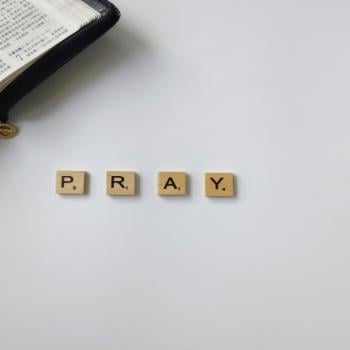
Thanking God after an Honest Confession
Once Guilty, Now Grateful!
Do you spend time thanking God during prayer? My curiosity compels me to ask this question, as I wonder how many people had a similar upbringing to mine.
Thanking God is a core principle my mother instilled in me by making me say grace before each meal.
God is great and he’s good! And we thank him for our food. By his hands, we all are fed; give us, Lord, our daily bread. In Jesus’ name, amen!
This is a simple prayer, resembling God’s goodness through the simplicity of childhood. Unfortunately, adulthood challenges and the guilt of sin make expressing gratitude to the Lord difficult.
Thankfully, making an honest confession about my transgressions frees me to demonstrate gratitude regularly.
I will help you experience this same freedom by exposing the dangers of complaining, defining gratitude, and revealing its benefits. Then, I’ll provide four ways to thank God by creating a grateful heart with prayer.
Forgetting to Be Grateful
The Dangers of Complaining
Before mentioning how to create a grateful heart with prayer, let’s briefly examine the dangers of complaining.
Merriam-Webster defines complaining as expressing grief, pain, or discontentment. Complaining also means making a formal charge or accusation against someone.
While everyone has the right to express their grievances, constant frustrations can turn into a bad habit.
Experts support this notion, saying that listening to someone complain for more than half an hour can damage our brains. Damage occurs as neurons branch out to one another to make information more easily transferred.
This means your chances of thinking negatively increase. Additionally, long-term complaining can lead to high levels of cortisol.
High levels of cortisol can cause high blood pressure, increase blood sugar levels, and lead to illnesses like cardiovascular disease.
Along with physical affliction, complaining can harm our relationship with the Lord. This is because doing some is sinful and a sign of ungratefulness toward God, who supplies our every need (“Too Busy Not to Pray,” 2007, Chapter 6).
The Israelites learn this after Jehovah Jireh burns the edges of their camp for complaining about the manna he gave them to eat in the wilderness. The Israelites were complaining about food when they should have been grateful for being delivered from slavery Similarly, the New Testament also instructs believers not to complain. Instead, we must live as pure and blameless children of God. in Egypt.
By doing so, we will become shining examples amid a crooked and perverse generation.
An Attitude of Gratitude
The Term and Its Benefits
Scripture correlates with this definition by urging readers to
- Thank the Lord for fellow believers.
- Rejoice and be glad in the day the Lord gives.
- Praise the Lord for his love and goodness.
- Give thanks in everything because it’s God’s will.
- Enter into the Lord’s gates with thanksgiving and praise.
Offering Eliohim thanksgiving and praise helps us honor God and has tangible benefits. These benefits include
- Freeing you from toxic emotions
- Improving heart health and sleep.
- Lessening anxiety.
- Reducing stress.
- Relieving depression.
We can experience these in prayer by giving thanks to God, demonstrating that we do not take him for granted. While believers understand the importance of thanking God, everyone battles the temptation to complain.
Thanking God with a Grateful Heart
Studying the Promises of God
We can overcome the temptation to complain and develop a grateful heart by studying God’s promises. These promises are in scripture and will come to pass because God is faithful.
Some common promises we can thank our faithful Creator for are
- Salvation comes once we confess and believe in Jesus Christ.
- Forgiveness comes after admitting and repenting from sin.
- Love and acceptance as we become the Lord’s children.
- Peace for those who pray and keep their minds on the Lord.
- Protection and his presence when we’re afraid.
- Direction for those who trust in the Lord and acknowledge him in all their ways.
- Provision for our needs according to his riches in glory.
These promises are essential for our spiritual growth and daily survival.
In addition to these guarantees, Psalm 37 has several promises I am learning to depend on. Psalm 37 deals with matters like committing your plans to God and turning away from evil, which are helping me surrender more of myself to God.
Specifically, this Psalm helps to believe that God will
- Give me the desires of my heart as I trust him (verse 4).
- Help me as I trust and commit my plans to him (verse 5).
- Direct my steps as I live a godly life (verse 23).
- Never forsake the righteous or leave their seed begging for bread (verse 25).
- Allow me to live in the land as I relent from evil and do good (verse 27).
Writing a Gratitude List
After meditating on the promises of God, you can write them down on a gratitude list.
This list will make you aware of the various ways God blesses you daily.
I began this practice two years ago during a difficult season in my life. I faced many trials, and I discovered optimism was no longer an automatic response in my thought process.
My mother advised me to write a list of five to ten blessings I could thank God for. This exercise helped and continues to open my eyes to how fortunate I am.
Interestingly, this list also leads to greater appreciation for God’s provision. Though far from rich, I realize there have only been a few days I’ve gone without necessities like clean, running water.
When I have gone without, it’s because of something being broken and not a financial lack. For this, I give God praise!
Additionally, David also gives God praise by writing a gratitude list known as Psalm 103. Here, readers will see David thanking God for his willingness to
- Forgive sins (verse 3).
- Heal diseases (verse 3).
- Redeem him from death (verse 4).
- Crown him with life (verse 4).
- Fill his life with good things (verse 5).
These are only a sample of the good things David mentions in his gratitude list. I encourage you to read the Psalm and thank God for how his blessings manifest in your life.
Thanking God in Two Other Ways
Once our gratitude lists reveal how blessed we are, we should strive to help others. This is because assisting others is a biblical command, because God expects us to show compassion to the needy.
Furthermore, Bill Hybels says assisting others helps us become selfless as we practice humility and put someone else’s concerns first. By meeting their needs, we discover we’re more blessed than we realize.
Three ways we can bless someone else are
- Giving money and clothes to an unsheltered person.
- Giving an elderly person a ride to the store, church, or an appointment.
- Doing a good deed for a friend or an “enemy.”
We can be consistent in doing good for others and remaining grateful by the type of music we consume.
Scripture is clear that music enables us to be filled with the Holy Spirit and can cast out evil spirits. Knowing this, I encourage you to listen to Christian songs that remind you to be thankful to God for everything.
Three of my favorite Christian songs are
- “Thank You Lord” (For Being There For Me) by Fred Hammond.
- “Tell God Thank You” by Chicago Mass Choir.
- “Thank You (Live)” by Bishop Rudolph McKissick.
These songs always usher me into thankful praise as I consider God’s goodness to me. “Be thankful in all circumstances, for this is God’s will for you who belong to Christ Jesus” (1 Thessalonians 5:18, New Living Translation).
Does this article lead you to thank God with a heart of gratitude? Are there other ways to practice gratitude that I didn’t mention? I’d love to hear your thoughts. Feel free to leave a comment. All feedback is greatly appreciated!













